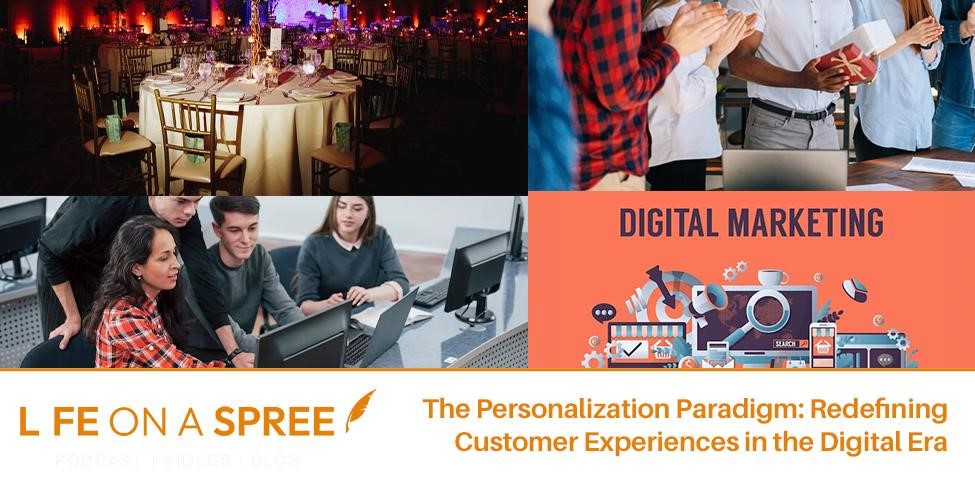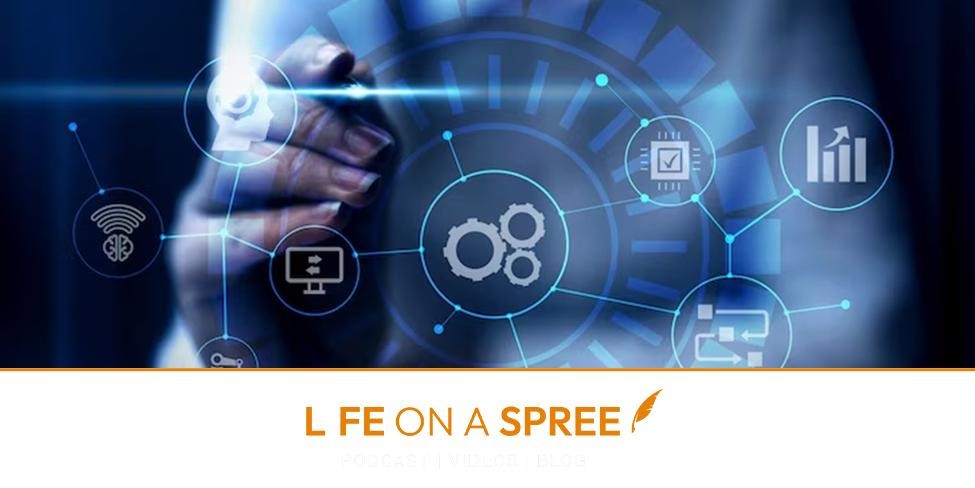
In today’s rapidly evolving business world, the digital revolution has fundamentally changed how companies connect with their customers. Let’s explore the thrilling realm of personalization across various sectors. Are you ready to unlock the secrets to crafting unforgettable experiences? Join us as we dive in and discover the transformative power of personalization together!
Embracing the Digital Revolution in Customer Experiences
In the ever-evolving landscape of modern commerce, the digital revolution has emerged as a transformative force, reshaping the way businesses interact with their customers. Gone are the days of one-size-fits-all approaches; today’s consumers demand personalized experiences tailored to their unique preferences and needs. This shift has given rise to the phenomenon of personalization, a powerful tool that empowers businesses to forge deeper connections with their audience.
The Rise of Personalization Across Diverse Fields
From events and gift-giving to marketing and technical education, personalization has permeated diverse sectors, revolutionizing customer experiences across the board. In the realm of events, personalized touches have become indispensable, as planners strive to create memorable moments that resonate with each attendee. Whether it’s a bespoke wedding celebration or a corporate gala, the emphasis is on crafting experiences that feel tailor-made for every guest.
Similarly, in the realm of gift-giving, personalization has become synonymous with thoughtful gestures that leave a lasting impression. From monogrammed keepsakes to custom-curated gift baskets, the options are endless, allowing individuals to express their affection in uniquely meaningful ways.
In the digital marketing arena, personalization has emerged as a game-changer, enabling brands to cut through the noise and deliver targeted messages that resonate with their audience. By leveraging data insights to understand consumer behaviors and preferences, marketers can create hyper-relevant campaigns that drive engagement and conversion.
Even in technical education, personalization has found its place, with institutes adopting tailored learning approaches to meet the diverse needs of students. From personalized coursework to individualized mentorship, students are empowered to learn at their own pace and focus on areas of interest.
Understanding Personalization

In the fast-paced realm of the digital era, personalization has emerged as a cornerstone of modern business strategy, reshaping the way brands engage with their customers. But what exactly does personalization mean in this context, and how has it evolved to meet the changing expectations and preferences of consumers?
At its core, personalization refers to the practice of tailoring products, services, and experiences to meet the specific needs and preferences of individual customers. In the digital era, this manifests in various forms, from targeted marketing campaigns to customized product recommendations and tailored user experiences.
Defining Personalization in the Digital Era
Defining personalization in the digital age goes beyond simply addressing customers by their first name in an email. It involves leveraging data and technology to gain deeper insights into customer behavior, preferences, and purchasing patterns. By analyzing data such as browsing history, past purchases, and demographic information, businesses can create highly personalized interactions that resonate with their audience on a personal level.
Evolving Customer Expectations and Preferences
As technology continues to advance, so too do customer expectations. Today’s consumers are inundated with choices and information, and they expect brands to cut through the noise and deliver experiences that are relevant, convenient, and meaningful. Generic, one-size-fits-all approaches no longer suffice; customers crave personalized experiences that demonstrate an understanding of their unique needs and preferences.
This shift in consumer expectations has forced businesses to adapt and evolve, placing a greater emphasis on personalization throughout the customer journey. From the moment a customer first interacts with a brand to the post-purchase support they receive, every touchpoint is an opportunity to deliver a personalized experience that fosters loyalty and drives satisfaction.
As we delve deeper into the concept of personalization in the digital era, it becomes clear that understanding and adapting to evolving customer expectations is key to success. By embracing personalization as more than just a buzzword and integrating it into every aspect of their business strategy, brands can forge deeper connections with their audience and stay ahead in an increasingly competitive marketplace.
The Power of Data
In today’s data-driven world, the power of data cannot be overstated. For businesses seeking to deliver personalized experiences to their customers, harnessing the wealth of data at their disposal is essential. By leveraging data analytics and advanced technologies, businesses can gain valuable insights into customer behaviors, preferences, and purchasing patterns, enabling them to tailor their offerings to meet individual needs and preferences.
Harnessing Data for Personalized Insights
The first step in harnessing the power of data for personalized insights is collecting and analyzing relevant data points. This may include information such as browsing history, past purchases, demographic data, and even social media interactions. By aggregating and analyzing this data, businesses can identify patterns and trends that provide valuable insights into customer preferences and behavior.
Armed with these insights, businesses can then develop personalized marketing campaigns, product recommendations, and user experiences that resonate with their audience on a personal level. Whether it’s sending targeted email promotions, recommending products based on past purchases, or personalizing website content based on browsing history, the possibilities for personalization are virtually limitless.
However, as businesses collect and utilize increasingly large amounts of data, concerns about privacy and data security have become more pronounced. Consumers are increasingly wary of how their personal data is being collected, stored, and used by businesses, and rightfully so. In an age where data breaches and privacy violations are all too common, maintaining the trust of customers is paramount.
Balancing Personalization with Privacy and Trust

Balancing the benefits of personalization with the need for privacy and trust is therefore essential. Businesses must be transparent about how they collect and use customer data, and they must take proactive measures to safeguard customer privacy and data security. This may include implementing robust data protection policies, obtaining explicit consent from customers before collecting their data, and providing customers with the option to opt out of data collection and personalized marketing efforts.
Ultimately, the power of data lies in its ability to provide businesses with actionable insights that enable them to deliver personalized experiences that delight and engage their customers. By harnessing data responsibly and ethically, businesses can unlock the full potential of personalization while maintaining the trust and loyalty of their customers.
Crafting Tailored Experiences
Crafting tailored experiences is an art form that extends across various facets of consumer engagement, from organizing events to selecting the perfect gift.
Personalization Strategies for Enhanced Events
For event planners in Delhi, the key to success lies in understanding the unique preferences and expectations of their clients and translating them into unforgettable experiences. By curating every detail, from selecting the best venues in Delhi to entertainment and catering, event planners can create bespoke events that leave a lasting impression.
Tailoring Experiences for Memorable Gift-giving
Similarly, in the realm of gift-giving, personalized gifts in India and premium corporate gifts in India have become increasingly popular for their ability to convey thoughtfulness and sentiment. Whether it’s a custom-engraved piece of jewelry, a monogrammed accessory, or a personalized photo album, these gifts speak volumes about the giver’s thoughtfulness and consideration.
Secret to Success
The secret to success in both event planning and gift-giving lies in tailoring experiences to the individual tastes and preferences of the recipients. This may involve conducting thorough consultations with clients to understand their vision for an event or spending time researching the recipient’s interests and preferences when selecting a gift.
By incorporating personalized touches, such as incorporating a favorite color scheme or incorporating elements of the recipient’s personality into the event or gift, event planners and gift-givers can create truly memorable experiences that resonate with their audience on a personal level.
Ultimately, whether it’s organizing a lavish wedding, a corporate gala, or selecting the perfect gift for a loved one, the key to success lies in the art of personalization. By understanding the unique needs and preferences of their clients and recipients, event planners and gift-givers can create tailored experiences that delight and inspire.
Customizing Marketing Efforts for Targeted Engagement

Customizing marketing efforts for targeted engagement is crucial in today’s digital landscape, where consumers are inundated with information and choices. For a digital marketing company in Mumbai, the key to success lies in delivering tailored messages that resonate with their target audience to provide the best digital marketing services. By leveraging data analytics and audience segmentation, these companies can identify specific demographics, interests, and behaviors to craft personalized campaigns that drive engagement and conversion.
Personalized Learning Approaches for Skill Development
Similarly, in the realm of skill development, personalized learning approaches are revolutionizing the way students acquire knowledge and expertise. At a laptop repairing institute in Mumbai, for instance, personalized learning methodologies cater to the diverse needs and learning styles of students. Through hands-on training, individualized mentorship, and customized coursework, students are empowered to learn at their own pace and focus on areas of interest.
The common thread between these two domains is the emphasis on personalization to meet the unique needs and preferences of the target audience. Whether it’s delivering targeted marketing messages or tailoring educational experiences, customization is key to driving meaningful engagement and fostering skill development.
By customizing marketing efforts, digital marketing companies can ensure that their messages resonate with their audience, leading to higher conversion rates and brand loyalty. Similarly, personalized learning approaches at laptop repairing institute empower students to acquire relevant skills and knowledge that are applicable to their career goals.
The Impact of Personalization
The impact of personalization on customer satisfaction and loyalty cannot be overstated. By tailoring products, services, and experiences to meet the unique needs and preferences of individual customers, businesses can create deeper connections and foster long-term relationships with their audience. Whether it’s recommending products based on past purchases, customizing marketing messages to reflect customer interests, or providing personalized support, these efforts demonstrate a commitment to understanding and addressing the individual needs of each customer.
Driving Satisfaction and Loyalty through Personalization
The result is not only increased satisfaction but also greater loyalty and advocacy. When customers feel understood and valued, they are more likely to return to a brand for future purchases and recommend it to others. In fact, studies have shown that personalized experiences can lead to higher customer retention rates and increased lifetime value.
Measuring the Effectiveness of Personalization Initiatives

However, measuring the effectiveness of personalization initiatives is essential for businesses looking to optimize their strategies and maximize their impact. This involves tracking key metrics such as conversion rates, engagement levels, and customer satisfaction scores to gauge the success of personalized efforts. By analyzing these metrics over time, businesses can identify areas of improvement and refine their personalization strategies to better meet the needs of their audience.
Additionally, gathering feedback directly from customers through surveys, interviews, and reviews can provide valuable insights into the effectiveness of personalization initiatives. Understanding how customers perceive and respond to personalized experiences can help businesses identify areas of strength and opportunities for growth.
Challenges and Opportunities
Overcoming Common Pitfalls in Personalization
In the realm of personalization, businesses encounter both challenges and opportunities as they strive to deliver tailored experiences that resonate with their audience. One common pitfall is the risk of over-personalization, where businesses inundate customers with irrelevant or intrusive messages. This can lead to a negative customer experience and erode trust. To overcome this challenge, businesses must strike the right balance between personalization and privacy, ensuring that their efforts are relevant, respectful, and transparent.
Another challenge lies in the complexity of data management and analysis. With vast amounts of data at their disposal, businesses must navigate issues such as data quality, integration, and security to unlock actionable insights. By investing in robust data management systems and analytics tools, businesses can streamline the process of collecting, analyzing, and leveraging customer data to drive personalized experiences.
Embracing Emerging Trends and Innovations
Despite these challenges, there are also numerous opportunities for businesses to innovate and differentiate themselves through personalization. Emerging trends such as artificial intelligence, machine learning, and predictive analytics offer powerful tools for delivering highly targeted and relevant experiences. By harnessing these technologies, businesses can gain deeper insights into customer behavior and preferences, allowing them to anticipate needs and personalize interactions in real-time.
Furthermore, the rise of omnichannel marketing presents opportunities for seamless and cohesive customer experiences across multiple touchpoints. By integrating data and messaging across channels such as social media, email, and mobile apps, businesses can create unified and personalized journeys that enhance engagement and drive conversion.
Conclusion
Personalization has revolutionized diverse sectors, from events to education. By embracing emerging trends and overcoming pitfalls, businesses can forge deeper connections, driving satisfaction, loyalty, and success in the digital era.

KjUlxHwTk
Your comment is awaiting moderation.